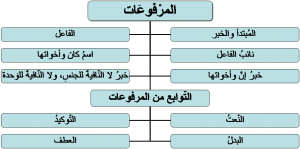Arabic Nouns: Nominatives Posted by Fisal on Apr 29, 2015 in Arabic Language, Grammar, Pronunciation, Vocabulary
Ahlan أهــْــلاً , Arabic lovers! Today, we are going to discuss the question raised in the previous post about Arabic Noun Cases. We have said that there are three cases for the Arabic nouns; the nominative case, the accusative case and the genitive case. The question was: what exactly are the nouns that belong to each of these cases and we will answer this question today. We will start by discussing the nouns that fall into the category of the nominative case حــالــة الــرفــع . That is the nominative nouns or nominatives or what we call in Arabic as Al-Marfou’at الــمــرفــوعــات .
Definition:
Nominatives or Al-Marfou’at المرفوعات are the nouns that are in the nominative case. They are marked by a Dammah ضــمــّــة (or an equivalent) on the ending letter(s). Adjectives that modify these nouns are in the same case and have the same Harakah (Tashkeel).
Nominatives (Al-Marfou’at):
- The Nominal Subject (Al-Mubtada’ الــمــُــبــتــدأ): It is usually the noun that starts the nominal sentence. It is always in the nominative case and has a Dammah or equivalent on its ending. It has different types. You can get more information about the nominal sentence by reviewing the post The Nominal Sentence and you can learn about the different types of nominal subjects by reviewing the post about them; The Nominal Subjects.
- The Nominal Predicate (Al-Khabar الــخــبــر): It is usually the noun or the other part of the sentence that completes the meaning in the nominal sentence. It follows the nominal subject or can sometimes be a fronted predicate. Learn about The Nominal Sentence. Learn about The Nominal Predicate. Learn about Multiplication of the Predicate. Learn about The Fronted Predicate.
- The Noun (Ism إســم) of Kana كــانَ and Sisters: We learnt that the incomplete verb Kana كــانَ and its sister verbs can come in the front of the nominal sentence. They change the nominal subject into the subject of them (Noun اســم of Kana and sisters). This noun is always in the nominative case. Review Kana and Sisters (1).
- The Predicate (Al-Khabar الــخــبــر) of Inna and Sisters: we learnt about Inna and sisters and knew that they also come with the nominative sentence but they change the Harakah of the subject. However, the harakah of the predicate remains the same (Dammah). That is to say that the predicate of Inna and sisters is in the nominative case. Revise The Predicate of Inna and Sisters.
- The Verbal Subject (Al-Faa’il الــفــاعــِــل): We learnt about The Verbal Sentence and knew that the subject of the verbal sentence is in the nominative case, so it has a Dammah (or an equivalent) on its ending. Review the Subject of the Verbal Sentence (Part 1) and (Part 2).
- The Deputy Agent (Naa’ib Al-Faa’il نــائــب الــفــاعــل): We learnt about the passive sentence and The Passive Subject (Deputy Agent). We also learnt that the passive sentence is a type of verbal sentence as it starts with a verb. Now, the deputy agent in the passive sentence is always in the nominative case and has a Dammah (or an equivalent) on its ending.
*****
Find all our grammar posts here; Index of Arabic Grammar.
*****
Check us back soon
Peace ســـَــلام /Salam/

Build vocabulary, practice pronunciation, and more with Transparent Language Online. Available anytime, anywhere, on any device.
About the Author: Fisal
Well, I was born near the city of Rasheed or Rosetta, Egypt. Yes, the city where the Rosetta Stone was discovered. It is a small city on the north of Egypt where the Nile meets the Mediterranean. I am a Teacher of EFL.




